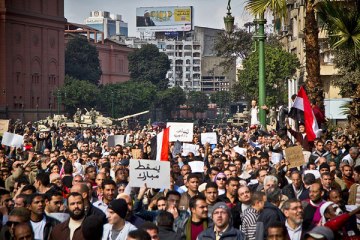In search of democracy Egyptians take to the streets

Sam Shropshire with protesters on Tahrir Square in Cairo. Sam went to Cairo to meet with Muslim Brotherhood members and their opposition.
(last updated 6 July 2013, 12:00 noon)
The whole world is watching
Media around the world are broadcasting live from the streets of Egypt as that nation is once more in the midst of political upheaval. With much of the international network reporting; however, comes a lot of sensational misinformation.

Millions of Egyptians pour into streets throughout Egypt to express their disappointment with President Morsi.
I’ve just returned from Cairo. While there, I had incredible discussions with both Egyptians who support the Mohamed Morsi government and with the opposition who are claiming some of the “biggest street demonstrations in the history of mankind.”
In Tharir Square I found the Egyptian people more than willing to speak freely and openly—to express opposing views.
I sat down with two groups—members of the Muslim Brotherhood and also members of the the Tamarod, or liberal “Rebel” movement. All of this comes on the first anniversary of the birth of what was hoped to be a new democratic Egypt.
As I entered discussions with the rebels, I could feel the drama building up to a potential showdown in Egypt. Pro-Morsi adherents boast that Morsi was democratically elected. Opponents to the Morsi government say Morsi has not kept his promises to include minority political views in his government.
The Egyptian military has announced both sides must develop consensus for a inclusive plan to eliminate national unrest.
All agree that these continuing street battles are about freedom, democracy, transparency in government, about a sound economy that benefits all the Egyptian peoples.
What is clear is that happened last ear in Egypt is but the first stage of a new order that is sweeping across North Africa and the Middle East. Citizens are expressing their opinions, and they will no longer be silent.
Add to the current chaos in Egypt our world economic turmoil and threats from the Egyptian army to “enforce the will of the people,” and the situation is volatile and could lead to violence.
Morsi had accepted the resignations of several cabinet ministers and has apologized for “mistakes” he had made during the first year of his administration—specifically for failing to include youth and other political minorities in his government.
To his credit, Morsi has repeatedly called for dialogue with opposition groups, but his administration says the opposition has declined.
Morsi has said, “We are changing Egypt for the better—through a free and democratic way.”
Cairo discussions with Muslim Brotherhood
I first met with members of the Freedom and Justice Party—the political arm of the Muslim Brotherhood. Waleed Alsharif was quick to point out that his Muslim Brotherhood friends seek to represent the concerns of all Egyptians—including minorities like Christians and Jews.
I had not brought up the subject of religious minorities, but Waleed quickly brought it up.
“We love Christians and Jews,” Waleed pointed out. “The Quran commands that we show them respect and that we advocate for their concerns as well.”
I asked, “What should Morsi do differently to gain the support of other Egyptian minorities?”
Waleed responded, “Morsi must be quick to include peoples of different faiths, different political perspectives and ages.”
The opposition Tamarod
Throughout Cairo one views opposition posters and graffiti condemning Morsi. Most of the posters call for Morsi to immediately resign, clearing the way for new elections.
Oppositionist Sahad Saleh, of the Tamarod, is quick to boast of anti-Morsi groups having collected more than 22 million signatures on a petition calling for the beleaguered Egyptian president to step down.
“The opposition will help complete the revolution,” Sahad proudly says. “We have corrupt officials leading our country. They must go.”
When I asked him for specific examples of corruption, he rattled off quite a few accusations, but was unable to come up with specifics, although with any new government greed and corruption seems to find a way.
Sahad and other opposition leaders are also quick to state that Morsi is not experienced and has no ability to lead Egypt, but then who does have such experience in Egypt?
As has been pointed out in recent days, the Egyptian opposition includes a melee of fractious political groups—including some Islamists even more radical than the Muslim Brotherhood.
One year ago, “free and fair” elections held
There is room for debate as to whether the hastily called elections held just over a year ago were indeed free and fair, given the short period of time various political parties had to organize themselves and conduct legitimate election campaigns.
After just one year, it’s easy to point out the many failures of the Morsi government, but what nation on earth has had an easy time at establishing a democracy as well as writing a constitution and developing laws to assure that all peoples have equal access to government and the freedoms that are necessary to guaranteeing a better future?
After the American revolution, it took the United States several years to write its Constitution and Bill of Rights. And it has taken many more years, through various amendments to the US Constitution, to make certain that the values encouraged by America’s Founding Fathers were applied to all its citizens and minorities. After all, in the US African slaves would not be freed for another 90 years, and once freed, they would not have the same rights as other Americans for another 100 years when the Civil Rights Act of 1964 was finally enacted. American women would not be able to vote until 1919.
More recently, the new governments of Central and Eastern Europe have not had an easy go at democracy. Since the fall of communism in 1989 and 1990, many of these governments, while having made significant progress at democratization, are still struggling to make a go of it.
With the breakup of the former Yugoslavia came years of war and revolution, horrific genocide and retribution.
Outright lies and false reporting
Some Islamophobic American radicals have had a heyday attacking the Muslim Brotherhood and other Islamic groups. Tabloid journalism and false reporting by some American extremists have been beyond belief.
Jay Sekulow who heads televangelist Pat Robertson’s Washington, DC, American Center for Law and Justice (ACLJ), has printed blatant lies about Egyptian “jihadists” said to be in control of Egypt’s future—sensational untruths. Sekulow claims Egyptian Christians are literally being burned on crosses in Cairo’s Tahrir Square. (There is absolutely no evidence of such atrocities!)
Most recently, the ACLJ and a handful of radical US congressmen have put out several “action alerts” claiming “the Obama Administration’s support for the Muslim Brotherhood is out of control.”
I have on numerous occasions phoned the ACLJ office in Washington, DC, to point out that no Christians are being crucified in Cairo. I have repeatedly requested documentation for their unsubstantiated claims. They have provided none, but they persist with their disinformation quickly followed by the words “Contribute Now!”
It’s most disconcerting when a few religious extremists (be they Christian, Muslim or Jewish) re-write stories, manipulating “facts” to their own ends, in apparent attempts to hurt people who don’t believe exactly as they do.

The army, seemingly in support of the opposition, fly helicopters hoisting the Egyptian flags over cheering demonstrators on Tahrir Square.
Egyptian military intervenes
Last week the situation in Egypt is became critical. The Egyptian military high command said last Monday that “if the demands of the people are not met” within 48 hours, the military would intervene with a “roadmap” to end the standoff. This announcement, broadcast on TV, was applauded by millions of men and women rallying in Tahrir Square and across Egypt demanding that Morsi step down.
Morsi deposed; the world reacts
As expected, Morsi refused to give in to the demands of the military. He pointed out that it was impossible to solve all the economic and political challenges in a single year. He readily admitted that mistakes had been made. “What example,” he said, “does it set if a democratically elected government can be easily dismissed before its four-year term has been completed?”
But by Wednesday evening, Egypt’s army chief Abdel Fattah Al-Sisi suspended the new constitution, dissolved parliament and ousted President Mohamed Morsi. Pro-Muslim Brotherhood radio and TV stations and newspapers were shut down. It was announced that the head of the Supreme Constitutional Court would be the new “caretaker” leader of Egypt.
For now, Morsi remains under house arrest. He claims the military has orchestrated a coup. The military says its wasn’t a coup but simply the armed forces imposing the “will of the people,” and millions of Egyptians continue to declare their future as democracy continues to evolve, not a the ballot box but in the streets.
US President Barack Obama was quick to release a statement expressing caution and concern, saying, “As I have said since the Egyptian Revolution, the United States supports a set of core principles, including opposition to violence, protection of universal human rights, and reform that meets the legitimate aspirations of the people. The United States does not support particular individuals or political parties, but we are committed to the democratic process and respect for the rule of law.”
Obama said the US would be closely monitoring the Egyptian situation. “I now call on the Egyptian military to move quickly and responsibly to return full authority back to a democratically elected civilian government as soon as possible through an inclusive and transparent process.”
UK Foreign Minister William Hague has said the UK “will work with the people in authority in Egypt” but condemned the ousting of its president as “a dangerous thing.”
Germany’s Foreign Minister Guido Westerwelle called the ousting of Egyptian President Mohamed Morsi from office a “major setback for democracy in Egypt,” and warned of repercussions for the entire region, as he emphasized the urgency that Egypt gets back to constitutional order as quickly as possible.
Saudi Arabia’s King Abdullah has sent a cable of congratulations to the interim president of Egypt Adli Mansour. In his message to Mansour, King Abdullah appealed to God to help him “shoulder the responsibility given to him and to achieve the hopes of his people.”
For now, millions of opponents to the Morsi government celebrate the military’s intervention, while supporters of Morsi are shocked and in disbelief at the quick fall of their democratically elected president.
Some elements within the Muslim Brotherhood are vowing revenge and martyrdom rather than accept Morsi’s ouster. Fareed Zakaria has given us this excellent comment about the Egyptian crisis.
But common among all the Arab Spring democracies is talk about pluralism and human rights. Various political parties are battling for consensus. For sure, democracies don’t just happen–they evolve.
Sources: on-site interviews, CNN, The Guardian, Arab News, Al Jazeera, BBC, Der Spiegel
7 Comments »
Leave a reply to Firoz Shroff Cancel reply
-
Archives
- November 2018 (1)
- June 2018 (1)
- December 2016 (1)
- November 2016 (1)
- June 2016 (1)
- May 2016 (1)
- July 2015 (1)
- March 2015 (2)
- February 2015 (1)
- October 2014 (3)
- September 2014 (2)
- August 2014 (1)
-
Categories
-
RSS
Entries RSS
Comments RSS




You look like an outstanding ‘target’. Good thing you didn’t get shot. You certainly stand out in a crowd. D
Thanks for your prayers, Heide! All is well. ~ Sam (back on my feet in Jeddah). Safi and I are looking forward to your visit in January.
Thank you for this balanced look at the situation in Egypt!
Suzanne, thank you for your comment. ~ Sam
Interesting.
_____
Look after yourself
Thank you, Firoz!